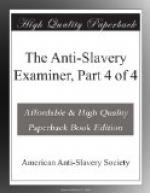From the time of the adoption of the Constitution of the United States, the institution of domestic slavery has been becoming more and more the abhorrence of the civilized world. But in proportion as it has been growing odious to all the rest of mankind, it has been sinking deeper and deeper into the affections of the holders of slaves themselves. The cultivation of cotton and of sugar, unknown in the Union at the establishment of the Constitution, has added largely to the pecuniary value of the slave. And the suppression of the African slave-trade as piracy upon pain of death, by securing the benefit of a monopoly to the virtuous slaveholders of the ancient dominion, has turned her heroic tyrannicides into a community of slave-breeders for sale, and converted the land of George Washington, Patrick Henry, Richard Henry Lee, and Thomas Jefferson, into a great barracoon—a cattle-show of human beings, an emporium, of which the staple articles of merchandise are the flesh and blood, the bones and sinews of immortal man.
Of the increasing abomination of slavery in the unbought hearts of men at the time when the Constitution of the United States was formed, what clearer proof could be desired, than that the very same year in which that charter of the land was issued, the Congress of the Confederation, with not a tithe of the powers given by the people to the Congress of the new compact, actually abolished slavery for ever throughout the whole Northwestern territory, without a remonstrance or a murmur. But in the articles of confederation, there was no guaranty for the property of the slaveholder—no double representation of him in the Federal councils—no power of taxation—no stipulation for the recovery of fugitive slaves. But when the powers of government came to be delegated to the Union, the South—that is, South Carolina and Georgia—refused their subscription to the parchment, till it should be saturated with the infection of slavery, which no fumigation could purify, no quarantine could extinguish. The freemen of the North gave way, and the deadly venom of slavery was infused into the Constitution of freedom. Its first consequence has been to invert the first principle of Democracy, that the will of the majority of numbers shall rule the land. By means of the double representation, the minority command the whole, and a KNOT OF SLAVEHOLDERS GIVE THE LAW AND PRESCRIBE THE POLICY OF THE COUNTRY. To acquire this superiority of a large majority of freemen, a persevering system of engrossing nearly all the seats of power and place, is constantly for a long series of years pursued, and you have seen, in a period of fifty-six years, the Chief-magistracy of the Union held, during forty-four of them, by the owners of slaves. The Executive departments, the Army and Navy, the Supreme Judicial Court and diplomatic missions abroad, all present the same spectacle:—an immense majority of power in the hands of a very small minority of the people—millions made for a fraction of a few thousands.




